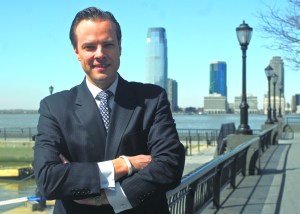
Of the four responsibilities handed to Guy Langford, a partner at Deloitte & Touche LLP, none has drained quite as much time over the past years as his work with distressed assets and debt.
That’s not much of a surprise, really, considering the state of the economy and the number of real estate owners struggling with overleveraged assets, and, on the other side, the real estate private-equity funds taking advantage of market opportunities.
But keeping in mind that Mr. Langford worked on more than $110 billion in buy-side merger-acquisition projects during the previous real estate cycle, the reversal has been an eye opener.
“We’re seeing quite a lot of interesting things happening on the distressed side right now,” said Mr. Langford, 43, during an hour-long interview last week at his office, in 2 World Financial Center. “The transactional activity I’m now seeing with my team has a distressed component. People might say, ‘Oh, I saw this deal being done,’ and I say, ‘The reason the deal was done was because the structure was distressed.'”
Indeed, since 2008, very shortly after Lehman Brothers collapsed, many of Mr. Langford’s real estate clients have been faced with selling off their assets simply because their loans were set to mature just as lending practices from the banks turned penuriously conservative. In Mr. Langford’s words, “Nine times out of 10—or maybe 10 times out of 10 right now—all the transactions we’re doing are actually distressed.”
Mr. Langford and his Deloitte team, who have represented the likes of the old Apollo Real Estate, Blackstone, Cendant Corporation, Lazard, Marriott, Starwood Capital and Rockwood, have not, however, surrendered completely to the whims of the distressed-asset world.
As for the other three hats he wears-mergers and acquisitions specialist, a hospitality industry expert and leader of Deloitte’s northeast regional real estate team of 300 accountants, M&A specialists, financial advisory teams and tax experts-Mr. Langford is busy regardless of the economic climate.
With most of his assignments skewing heavily toward the transaction side—as opposed to, say, auditing or taxes—Mr. Langford stands on the precipice of what he described last week as a rapid resurgence in the hotel industry.
Although Mr. Langford is tethered to nondisclosure agreements and could not speak specifically about his clients, he did say that, in general, hospitality operators, be they at hotels, casinos or other tourism magnets, are now being taken over primarily by Real Estate Investment Trusts across the country. In fact, approximately 47 percent of all hotel acquisitions by dollar volume over the past six months have been by the REITs, according to a report last week by Real Capital Analytics.
“You have this situation where, two or three years ago, their asset wasn’t producing a lot of net operating income,” said Mr. Langford, who became a partner at Deloitte in 2000. “But now the demand for their asset has increased. People are traveling more. People are doing more travel for leisure and for business. In certain markets, like the gateway cities, those assets are hot, and they’re easy to get financing for.”
MR. LANGFORD WAS raised in the land down under-Melbourne, Australia, to be exact. Shortly after graduating from the University of Melbourne with a degree in commerce, he took a job at Deloitte in Sydney, crunching numbers for a variety of companies, hardly any of them within the real estate industry. It was only after being transferred to Deloitte’s Washington, D.C., offices in 1994 that Mr. Langford’s specialty circled there.
“Increasingly, the focus started to narrow, narrow, narrow,” he said. “I enjoy real estate. It’s nice to drive past a building and be able to say, ‘I know that building, I know who owns it, I know who’s got the debt on it, I know who designed it’ and whatever else.”
When he transferred again, this time to Deloitte’s Manhattan headquarters at 1633 Broadway, it was 1997, and the local real estate market was beginning to pick up steam once again. With a new wife and an apartment in Lower Manhattan, Mr. Langford started to establish roots in the city.
As late as 1995, Deloitte had leased space in the World Trade Center. But shortly after terrorists ignited a bomb in one of the building’s garages two years earlier, the group made a decision not only to find space elsewhere, but to look for it on lower floors, he recalled.
The result, Mr. Langford said, was for Deloitte to ink space at 2 World Financial-a decision that may well have saved lives. As for the attacks of 9/11 eight years later, Mr. Langford was with his wife as she gave birth to their first child, a girl they named Grace.
The ensuing hysteria from the attacks prompted Mr. Langford and his family to relocate from their home in Lower Manhattan to Hoboken. At the same time, Deloitte was forced to occupy temporary space across New York as workers cleared the surrounding area.
“My daughter was actually born in the early hours of Sept. 12,” said Mr. Langford, now the father of three. “So my wife was in labor, and we actually lived downtown. So it was a horrific and scary experience-but we were one of the few with a happy story to tell. We had our girl, amazing Grace.”
A bass guitarist who plays in a rock band with friends, Mr. Langford now lives in Chatham, N.J., with his wife, who worked at Deloitte before taking a position at Deutsche Bank. She is now a stay-at-home mother, a job Mr. Langford calls “challenging.”
“I wouldn’t say I have it easy, but hers is a tough gig,” he said. “It requires different skills, being an accountant. I can use logic, rational behavior and common sense to solve problems, whereas, with a child, it’s not always logical. It’s a lot different.”
jsederstrom@observer.com



